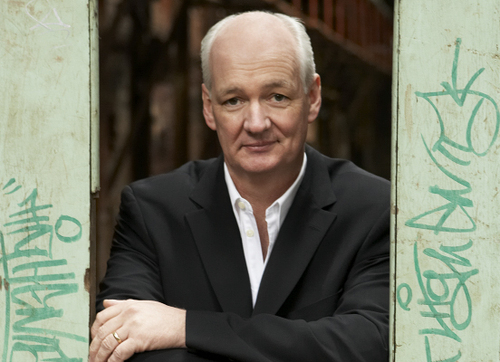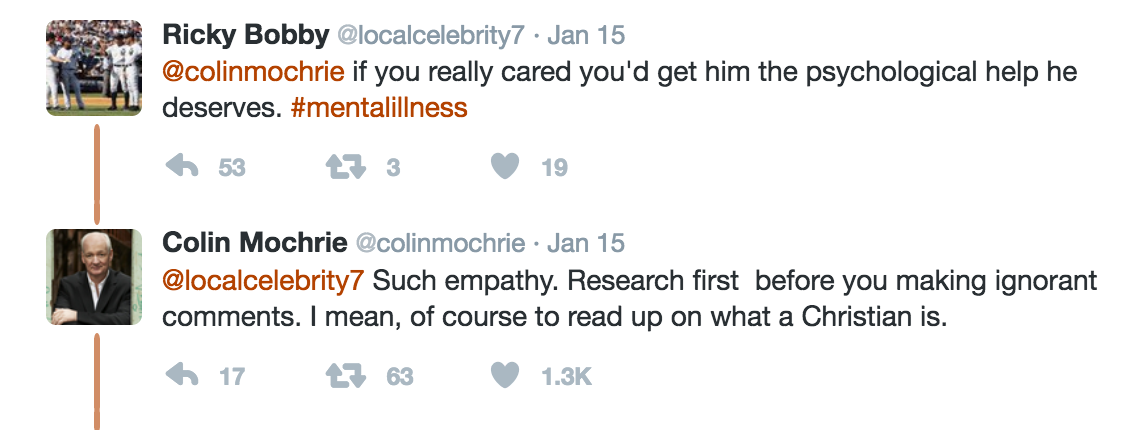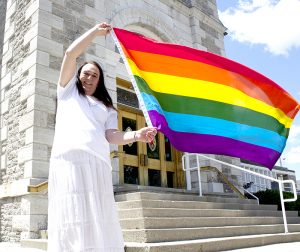Showing support for the transgender community

Canadian actor Colin Mochrie says he will continue to advocate for the transgender community if they want or need him to. Photo courtesy of Colin Mochrie’s public Twitter.
BELLEVILLE – The transgender community has a new ambassador if they want him to be, says Canadian actor Colin Mochrie.
The 59-year-old comedian, who is best known for his role on Whose Line is it Anyway? sparked a flurry of reactions when he took to Twitter to voice his support for his transgender daughter, Kinley, back in January.
My 90-yr-old mother-in-law and 87-yr-old mother love and acceptance of our trans daughter warms me. Wonder why some who are younger can’t.
— Colin Mochrie (@colinmochrie) January 15, 2017
Local transgender activist, Stacey Love Jolicoeur, says transgender people are often discriminated against solely based on their sexual orientation.
She adds that having the support of individuals like Mochrie is a huge help in spreading the message of acceptance.
“I think it’s a huge opportunity for our community,” she said. “As we know, celebrities are followed more closely than just the average person so utilizing that as an opportunity I think is huge.”
Mochrie, a Toronto resident, said while he isn’t by any means the official spokesperson for the transgender community, he is more than happy to help where he can.
“I don’t know if any group really wants an old white man to talk about the trials and tribulations their particular group is going through,” he said joking, “but I’m definitely there to support and I’m definitely there to be an ally. If they need me to be an ambassador, I will certainly be that.”
But not everyone was supportive. A few Twitter users had left comments on Mochrie’s post that he said were both ignorant and uneducated.

A screenshot of some of the negative Twitter comments left by users on Colin Mochrie’s tweet.
“It saddens me that in (2017) we are still dealing with bigotry and discrimination all across the board,” he said. “There’s so many people out there ready to judge people who are different from them – especially the transgender community.”
When Mochrie’s 26-year-old daughter came out as transgender last April, he said he and his wife, Deb, were nothing but supportive.
“It’s the same kid that you were there with from the beginning,” he said. “I think from the very beginning the lines of communication were very open.”
But for the comedian, he said he was most surprised by how Kinley’s grandparents took the news.
“I was very shocked when both of our mothers accepted unconditionally because they have no reference point really,” he said. “When they were growing up, transgender people were like a joke. They were like the bearded lady in the circus or whatever.”
Mochrie added that his daughter knows she has been fortunate to receive such a large outpouring of support since not everyone is afforded that luxury.
“There’s so many other things that we could be focusing on to make the world a better place so let’s just get to that,” he said. “Let’s just accept each other and work on making (the world) the best it can be.”
Educating the public and helping advocate for the transgender community is something that Quinte West resident, Stacey Love Jolicoeur, has dedicated her life to.
Identifying as a two-spirited transgender woman, Jolicoeur said the road to acceptance hasn’t always been an easy one.
It was at nine-years-old that she said she first identified as a trans person.

Stacey Love Jolicoeur, who identifies as a two-spirited transgender woman, can be seen holding the gay pride flag at an event in downtown Belleville in June 2016. Photo by Makala Chapman, QNet News
“Unfortunately at that time in society it was not understood nor was it welcomed,” said Jolicoeur. “I was silenced for a very long time because of my family pressures and society pressures and religious beliefs. I was forced to be somebody who I really wasn’t.”
Now at 58-years-old, Jolicoeur is fully transitioned, both mentally and physically, into the body she says is true to her authentic self.
Jolicoeur is also the coordinator for TRANSforum Quinte, a local transgender support group. She says while the Quinte region has generally been very warm and welcoming to the transgender community, there’s still more work to be done.
“Gaining accessible employment is always a huge issue,” she said. “One of our local employment agencies was struggling because they had four trans people that they were having difficulty finding jobs for.”
Jolicoeur says lack of acceptance was one of the main reasons the employers would not hire the trans workers.
But for the transgender activist, she maintains that education is key in changing people’s perception of trans people.
“I went to that employment agency and I gave them a workshop on creating LGBT competency,” she said. “Within the first week after that workshop, all four trans people were able to get employed.”
The consequences of marginalizing a minority group are huge, says Jolicoeur, who also works at the Canadian Mental Health Association.
“The (suicide) rate among trans people is astronomical,” she said. “Over 77 per cent of our population, the trans community, will consider suicide. The unfortunate number is that 45 per cent will actually attempt.”
Jolicoeur’s statistics are based on research compiled by Rainbow Health Ontario, a lesbian, gay, bisexual, trans and queer advocacy organization, and the Canadian Mental Health Association.
But when there is love and acceptance in the home from friends and family, that rate drops by 93 per cent, said Jolicoeur.
Like Mochrie, the trans activist says the first step to acceptance is to promote dialogue that will educate the public and challenge their thought process.
“When we think of the way that society has been raised on the binary being that there’s just male and female only,” she said, “we can understand why they have this misconception and misunderstanding about the trans community.”
But for now, Jolicoeur says the times are changing for the better and that she’s seen incredible changes in her own community over the last few years.
“I would say that our community is big and strong,” she said. “I’ve watched our parade for the last five years grow from a small group of about 30 people doing a march to a parade that had over 300 people in it last year.”
 Print This Post
Print This Post






